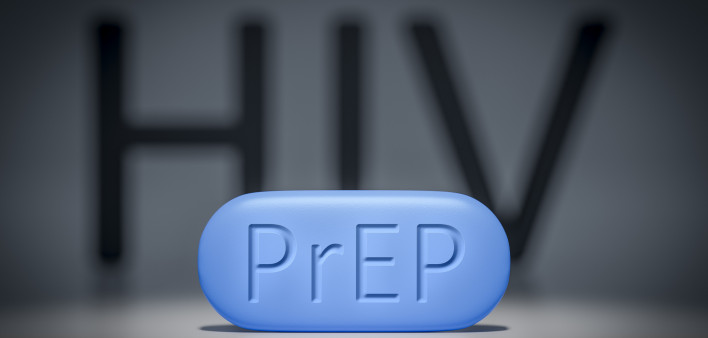EDITOR’S NOTE: A federal jury ruled May 9 in favor of HIV drugmaker Gilead Sciences in a lawsuit brought by the federal government regarding patents over Truvada and Descovy used as pre-exposure prophylaxis (PrEP) to prevent HIV. In short, the jury ruled that Gilead has not infringed on patents of the Centers for Disease Control and Prevention (CDC) and that the patents were invalid. For more about the case, see “Gilead ‘Won on All Counts’ in Billion-Dollar HIV PrEP Lawsuit.” On May 10, HIV activists with PrEP4All joined the Public Interest Patent Law Institute to release the below statement.
Statement from PrEP4All and PIPLI
on the Disappointing Verdict in US v. Gilead
PrEP4All and the Public Interest Patent Law Institute (PIPLI), along with their legal representatives at Columbia Law School’s Science, Health, and Information Clinic, are deeply disappointed in yesterday’s verdict in United States v. Gilead.
The United States v. Gilead case creates an opportunity to correct a decade-long injustice that led to hundreds of thousands of new HIV infections. The US government invested at least $143M in HIV PrEP research that served as the primary basis for FDA approval of the first PrEP product in 2012. In the years since, Gilead has profiteered on this groundbreaking public science. For many years now, the company has charged American patients an obscene price for PrEP—over $20,000 per patient per year. Gilead’s high prices have limited access to PrEP, perpetuating the HIV epidemic. And, for many years now, Gilead infringed on publicly owned patents on PrEP that emerged from groundbreaking research at the Centers for Disease Control & Prevention (CDC).
If yesterday’s verdict stands, American taxpayers will be robbed once again. Gilead—a multi-billion dollar pharmaceutical company that has needlessly caused immense human suffering—will get away without paying a dime to the public despite its billions in profits and years of infringement.
The consequences here could be even bigger than Gilead and HIV/AIDS: If the Department of Health & Human Services (HHS) and Department of Justice (DOJ) do not vigorously enforce these patents, they may encourage other drug companies to privatize and profit from publicly developed technology, with impunity.
We urge the DOJ to contest the verdict in post-trial motion practice and on appeal (if necessary). The government’s case is fundamentally strong. Taxpayers paid for CDC’s and NIH’s invention and development of HIV PrEP, and CDC scientists patented their work. The government attempted, for years, to negotiate with Gilead a reasonable license to these patents. Gilead refused. The government’s patents have withstood validity challenges that Gilead brought at the Patent Trial and Appeal Board. The European Patent Office also upheld validity after a challenge by Mylan.
Given the government’s lack of transparency and lack of interaction with advocacy groups who advocated the litigation, we fear that the DOJ failed to present the strongest and most compelling case to the jury. Representatives from affected communities, including people living with HIV, could have been assets to the government’s case and served as witnesses to describe the non-economic harm that Gilead caused.
If the government prevails and obtains a royalty from Gilead, the proceeds could provide badly-needed funding to expand access to PrEP, HIV testing, and related care. Gilead’s effort to exploit public research and set PrEP at a luxury price is the single most significant reason why PrEP has only reached a quarter of Americans who would benefit most from it, with only 9% and 16% of Black and Latinx individuals in greatest need gaining access. For years, advocates have called for a National PrEP Program that empowers the federal government to secure fair public health prices for PrEP medications and related laboratory tests for uninsured persons; builds capacity throughout a PrEP-provider network, which encompasses clinical care providers as well as nonclinical community-based organizations and other partners that can reach people who aren’t accessing traditional health care sites; and invests in community education efforts. These funds could make that vision a reality.
Gilead has a long, sordid history of gamesmanship, exploitation of the American public, and profiteering at the expense of communities affected by infectious disease: not only HIV, but also hepatitis C (HCV). In 2015, Gilead was the subject of a bipartisan Senate report that found that the company set egregious prices of over $90,000 for its HCV cures despite having not invented them, knowing that it would place exceptional burden on public payers, and knowing that it would limit access. According to that bipartisan report, while Gilead “asserted that its primary concern in developing and marketing [its drug] was to treat the largest number of HCV patients possible,” “[i]n reality, Gilead’s marketing, pricing, and contracting strategies were focused on maximizing revenue—even as the company’s analysis showed a lower price would allow more people to be treated.” The company’s decision continues to have repercussions as 15,000 Americans still die of HCV each year. Presently Gilead is facing another lawsuit for its decision to delay, for years, research into a newer form of tenofovir (TAF) for the treatment of HIV in order to maximize profits; in 2018 the company’s own modeling concluded that delaying access to TAF could lead to 16,200 additional deaths and over 150,000 additional injuries over a nine year period for people living with HIV.
The United States v. Gilead case is a moment where Gilead could finally be held responsible for its corporate culture of exploitation and abuse. Sadly, with an obscene amount of financial and legal resources at its disposal, Gilead may again buy its way out of accountability.
The government must continue to press its case on behalf of the American people, including an appeal (as necessary). We demand that Gilead pay for years of infringement of publicly owned patents, for years of profiteering on PrEP, and for the toll its profiteering has taken on the health of the American public.







Comments
Comments